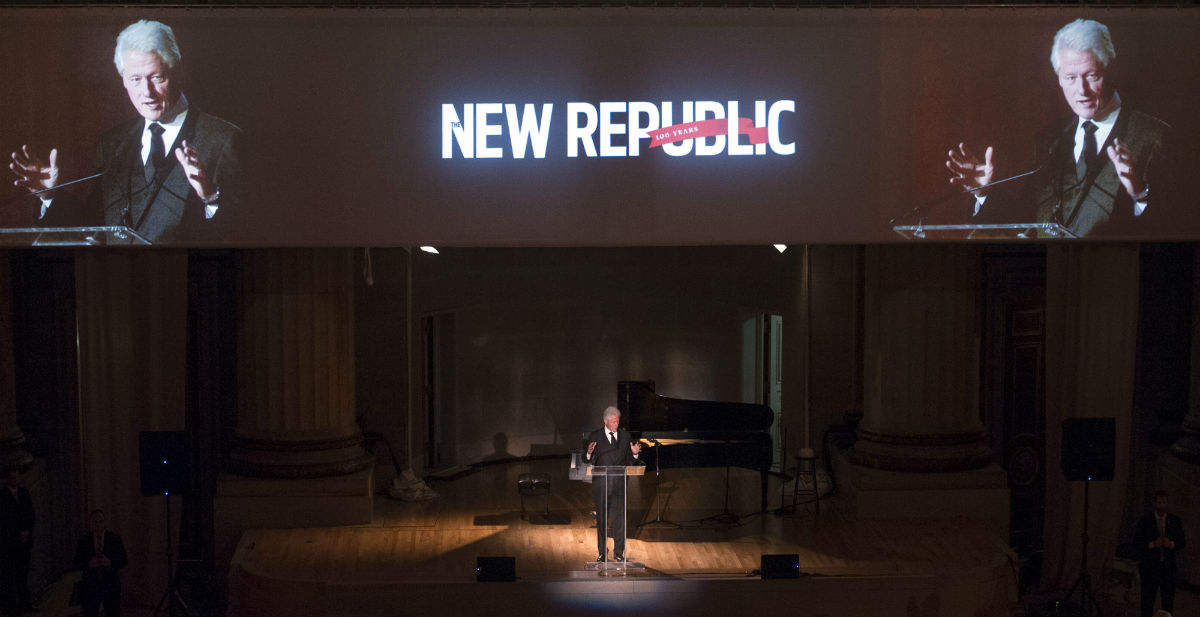It was cloudy in Washington last weekend, but you’d be forgiven for thinking the shade came from political journalism’s titanic ego hovering over the city.
Videos by Rare
Chris Hughes, the increasingly despotic owner of the New Republic, had just fired two of his top editors, and journalists were on the verge of immolating themselves in Farragut Square. Most of the magazine’s writers resigned en masse. Jacob Weisberg declared “Anybody who didn’t quit TNR today deserves to be fired.” Clive Crook perfectly captured the hysteria in a column titled “Without the New Republic, I have no reason to live.”
You would think we were in the midst of a recession that was squeezing newspapers and magazines or something. And it is a genuine shame that another media institution is being hollowed out. As the endless encomiums note, the New Republic was a unique voice on the left, one that often challenged modern liberalism’s most sacred tenets. The magazine supported welfare reform in the 1990s and attacked affirmative action earlier this year.
But let’s not confuse ideology with iconoclasm. The New Republic wasn’t non-liberal; it just subscribed to a different, and very destructive, form of liberalism. This liberalism, which hearkens back to the progressive movement of the 1930s, is founded on a sweeping idealism that’s often manifested in support for hawkish policies. Its closest companion isn’t the modern left, but national greatness conservatism as espoused by “moderate” Republicans like John McCain and David Brooks.
Most of the encomiums have noted that the New Republic was founded in Theodore Roosevelt’s living room. But from there they leapfrog over much of the magazine’s history. Like it’s sympathy for Mussolini, expressed in a 1927 editorial by Herbert Croly headlined—without irony—“An Apology for Fascism.” Or its cheerleading for Russian communism, which led it to laud the Bolsheviks who “stand for rationalism, for an intelligent system of cultivation, for education, for an active ideal of cooperation and social service.” Michael Straight, who published the magazine in the 1950s, would later confess to being a KGB spy.
The magazine has long since abandoned the Soviet Union. But its sweeping idealism and zeal for grandiose projects endures—only now the project is world peace and democracy, and the delivery system is American might. Since its odd reversion to isolationism during World War II, the New Republic has rarely met a war it didn’t like, from Vietnam (“act decisively now”) to the First Gulf War (its cover had Saddam Hussein sporting a Hitler mustache) to Afghanistan (“making the world safe for Americans”). (Elon Green has a great summary of all this.)
So when George W. Bush discovered that Saddam Hussein was an existential threat to Western civilization, the New Republic was there to egg him on. In an unsigned editorial published in February 2003, the magazine accused antiwar liberals of “intellectual incoherence” and charged that the end result of their policies would be Iraq acquiring a nuclear weapon. “The mask of nuanced criticism has been pulled off the moderate antiwar position, exposing it for the abject pacifism it truly is,” it proclaimed.
A year later, after those antiwar liberals were proven wholly correct, the editors expressed regret for supporting the Iraq invasion. But that didn’t stop its senior editor from defending the American intervention against Moammar Gaddafi, which plunged Libya into jihadism and chaos. Nor did it stop the editors from demanding that President Obama arm the Syrian rebels and bomb Bashar al-Assad. Even after it became clear that Assad’s army was one of the few willing to fight ISIS, contributor Fred Hof penned three separate articles proposing that we attack ISIS and Assad at the same time.
This is a liberalism we rarely hear from anymore, one that was raised on Orwell, spooked by McGovern, and dragged home piss-drunk from parties thrown by Christopher Hitchens. Its forebears are progressive intellectuals like Croly and its contemporaries are neoconservatives with whom it shares a passion for a world that reflects back American values.
It’s also a liberalism that’s heavily influenced by pro-Israel intellectuals. Both Leon Wieseltier, the New Republic’s ex-literary editor, and Marty Peretz, its former owner, were vocal supporters of the Israeli state. Peretz once wrote that “Muslim life is cheap, especially to Muslims” and wondered if “these people” should be stripped of their First Amendment rights. (He later apologized, though only for the First Amendment part.)
Jacob Heilbrunn, a former New Republic writer, says he “witnessed with mounting incredulity the magazine’s steady march rightward on foreign policy, which was championed by both Peretz and…Wieseltier.” My only quibble is with the word “rightward.” Liberals believe in making victims whole through government action; for the New Republic, oppressed populations were victims and military intervention was government action.
The problem is that this rarely works out as planned. A magazine as old as the New Republic should have learned that lesson—after World War I, after Vietnam, after Iraq, after Libya. As journalists lament how their lives have been turned upside down by Chris Hughes, they should take a minute to remember the many lives that have been turned upside down by failed wars supported by the New Republic.



